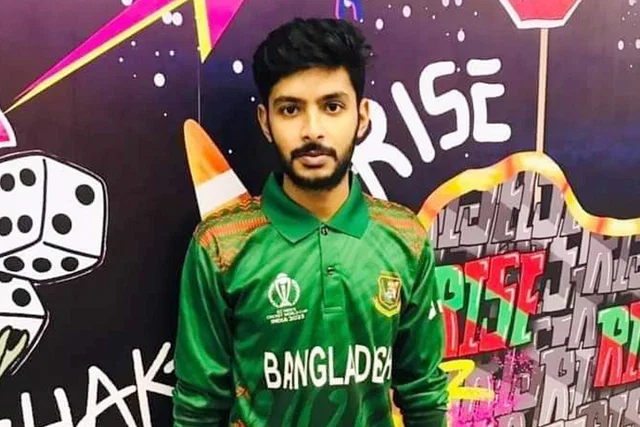Around 5:30 PM, Sagar called and said, “Father, the situation here is not good. Please send me a thousand takas via bKash.” I told him to be careful. After the call, I went to Narua Bazaar, sent the money via bKash, and returned home on my bicycle. I tried calling him to confirm if he had received the money, but he didn’t answer. From that moment, I felt a sense of unease.
After finishing Maghrib prayer and turning to complete the Salam, my phone rang in my pocket. My heart sank. My daughter, Musumi, called and said, “Father, come home.” When I arrived, everything was chaotic. No one was saying anything. My elder brother’s son-in-law, Ranju, was moving about anxiously. Finally, one of my grandchildren said that Sagar had been shot in the head and was in the hospital.
These are the words of Tofazzal Hossain, a farmer from Narua Union in Baliakandi Upazila, Rajbari. His son, Sagar Ahmed (22), was a second-year political science student at Mirpur Government Bangla College. Sagar was shot and killed during the quota reform movement on July 19 at Mirpur-10 Circle in Dhaka. His body was buried in his village on the evening of July 20.
Visiting Sagar’s house last Sunday, I found his speechless mother, Golapi Begum, lying in bed in one room of their tin-roofed house. In another room, his father, Tofazzal Hossain, was crying out in grief. Sagar’s only sister, Musumi, was being coaxed by relatives to eat something on the veranda. Musumi is scheduled to take her HSC exams next year from Narua Liakat Ali Smriti High School and College. Sagar had dreamed of bringing her to Dhaka for coaching and university education. They had planned to live together in the city. Sagar used to live with his cousin, Saiful Islam, in a mess in Mirpur-1 Mazar Road area.
Tofazzal Hossain recounted, “Whenever we spoke, Sagar would say, ‘Father, you won’t have to toil under the sun anymore. I will get a job and bring you all to Dhaka.’ My precious son worked in a hotel. He would bring food back at night and give it to the people on the streets.” He added that Sagar spoke to his parents on the morning of July 19. “Sagar told his mother, ‘The situation in Dhaka is not good. Pray for me; I am going to join the movement.’ His mother told him not to go, but I (the father) said he should go; otherwise, he would be a hypocrite. Then, seeking his mother’s blessing, Sagar said, ‘Mother, pray not just for your Sagar, but for thousands of other Sagars.’”
After Friday prayers on July 19, Sagar told his cousin, Saiful, that he was going to join the movement. Despite being advised against it, he left around 5:30 PM, as reported by his other cousin, Masud Hossain. Masud told Prothom Alo that when Saiful heard gunfire, he tried calling Sagar but couldn’t reach him. In the evening, an unknown person called Saiful from Sagar’s phone and informed him that Sagar had been shot. Saiful, along with a friend, searched hospitals for Sagar. The next morning, they identified Sagar’s body among the stacks of corpses at Suhrawardy Hospital by his identification card. It was found that a bullet had entered the right side of Sagar’s head and exited through the back. Without an autopsy, they took the body back to their village in the afternoon.










